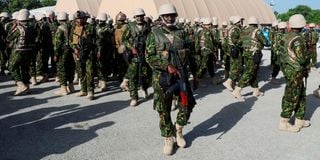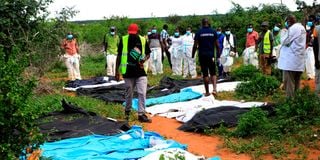Premium
Kenya bags Sh2 billion anti-terror funding

Members of the first contingent of Kenyan police when they arrived in Port-au-Prince, Haiti June 26, 2024.
What you need to know:
- Beyond mainstream intelligence operations that majorly involves collecting information from persons, DG Haji said the Service was also relying on drone technology that supports initiatives such as resource mapping, food security projections among others.
- Other facts of modern technology that are required to improve the country’s surveillance system and gathering intelligence include Artificial Intelligence, quantum computing, blockchain, the Internet of Things, biotechnology and climate innovation.
Kenya’s success in combating terrorism over the last year has paid off with Nairobi being given the mandate to lead a Sh2.3 billion programme designed for peacebuilding and prevention of violent extremism in the region.
This programme, funded by the Korean International Cooperation Agency (KOICA) and the United Nations Development Program (UNDP) will be led by Kenya and implemented in Somalia and South Sudan.
While launching the project earlier this week, Internal Security and National Administration Principal Secretary, Raymond Omollo, said this mission will strengthen regional cooperation and build sustainable solutions to counter violent extremism.
Admitting that terrorism is a serious threat to security not only to Kenya but the region, PS Omollo said this development is a step in the right direction in building a better and safer world.
The Internal Security State Department boss said that religious-motivated violence is also taking root in the country and referred to the Shakahola massacre where hundreds of people died following the extreme teachings of their religious leader.
A recent report by the National Crime Research Centre (NCRC) dubbed “Crime and Religion” established that religion is sharply taking up a large chunk in the radicalisation of thousands of the faithful who, as if under a spell, follow every word of their extremist leaders.

Bodies exhumed at Shakahola Forest being loaded to a Police Van in this photo taken on May 13, 2023.
This was the situation in Shakahola in Kilifi County which saw hundreds of persons starving to death after being convinced that they would go to heaven by their leader, Paul McKenzie who is currently in custody awaiting the court’s decision for his role in the shocking event.
Unemployment
Lack of employment opportunities for the youth and limited access to quality education to enhance their skills is largely to blame for their enrollment by radical groups’ leaders who exploit their vulnerabilities and use them to execute violent acts, PS Omollo said.
“By offering these alternative means of livelihood, we will greatly reduce the chances of our youth being radicalised. Social cohesion and peace cannot be enforced but embraced by the communities,” he said.

Ministry of Interior Principal Secretary Raymond Omollo.
Other than economically motivated factors, more triggers for conflict in the region include exposure to violent extremist ideologies on the internet as well as sensational coverage of acts of violence by social and mainstream media.
This programme will utilise a network of over 500 community peacebuilding committees in the country consisting of the youth, women, village elders, national administration officers and faith leaders, who will be working to identify potential causes of extremism and help in mitigating them before things run out of hand.
Through this strategy of engaging the locals, Kenya has witnessed a significant decline in the execution of violent extremism and insurgency activities in the volatile arid and semi-arid prone to such acts of violence.
A recent survey released by the Horizon Analysts and Researchers Network (HARN) showed that the rate of deterrence, interception and foiling of potential terror attacks in Wajir, Lamu, Garissa and Mandera has significantly increased effectively reducing cases of terrorism in the volatile arid and semi-arid counties.
“The counties of Wajir, Mandera, Garissa and Lamu saw a staggering 60 per cent decline in attacks carried out by Al-Shaaba. The surge in successful counterinsurgency activities corresponds to an unprecedented increase in collaboration between local communities and security agencies,” HARN stated.
Communal
To effectively deal with the complex issues surrounding terrorism, insecurity and conflict affecting the region, the United Nations Development Programme, Resilience Hub Director, Zeynu Ummer said the community must be engaged at all levels.
“The main objective of this new programme in East Africa is to provide communities that are resilient and will engage the communities to provide localised solutions and will also include women and the youth to effectively address insecurity and violent extremism cases in the region,” he said.
On her part, Deputy Director, KOICA -Kenya Office, Songi Han said the building of peace must come from the people at the lowest level in the communities before being upscaled to national and regional levels.
“To effectively deal with challenges of insecurity and violent extremism, it is crucial to establish the drivers behind them and work with the communities to deal with the root causes,” she said.
For instance, the increased cases of internal displacement of individuals in the region owing to insecurity and armed conflict is a key driver of youth being radicalised and joining violent extremist groups, Ms Han said.
This development comes barely a week after the National Intelligence and Research University (NIRU) was granted a charter to operate on its own and not as a constituent college of the National Defence College.
The National Intelligence Service (NIS) Director General, Noordin Haji said the university will boost research, redevelopment and innovation in the intelligence sector thus providing the nation with an advantage in solving complex issues.
“Over the years, our investment in research and development has enabled us attain 40 per cent autonomy through homegrown solutions. We aspire to grow to close to 100 per cent,” he said.

National Intelligence Service director-general Noordin Haji.
Beyond mainstream intelligence operations that majorly involves collecting information from persons, DG Haji said the Service was also relying on drone technology that supports initiatives such as resource mapping, food security projections among others.
Other facts of modern technology that are required to improve the country’s surveillance system and gathering intelligence include Artificial Intelligence, quantum computing, blockchain, the Internet of Things, biotechnology and climate innovation.
With the recently launched Sh2.3 billion programme, Mr Haji’s aspirations for mobilising more resources to boost the university’s capacity in advancing research and technology to enhance technology transfer in the region is fast taking shape.
Additional funding to the security sector “will allow us (Kenya) to be self-sufficient and less reliant on foreign hardware and software” the country’s top spy chief said.
“In living up to its billing as a regional security power, Kenya is always ahead of the pack in exploring ways of addressing modern security threats. The ever-evolving global security threats need investment in training and research to empower security and intelligence officers to be steps ahead of the criminal elements,” he concluded.
Region leader
President Ruto, while granting NIRU its charter said Kenya will be taking the lead in the collection of intelligence and research to guide its strategic response to a broad spectrum of global challenges, national security threats, climate change, organised crime and food insecurity.

President William Ruto.
The fact that this pioneer university for intelligence education in Africa will be training intelligence officers from Eastern Africa countries such as Uganda, Tanzania, Rwanda and Burundi made Kenya a more tangible choice in leading the programme for peacebuilding and prevention of violent extremism in the region. with prospects of broadening scope to the entire continent.
Other than serving officers from the region, Kenya will also allocate slots to officers from Ghana, South Africa, Botswana and Cote d’Ivoire as well as support intelligence organisations in the continent to set up similar institutions.





